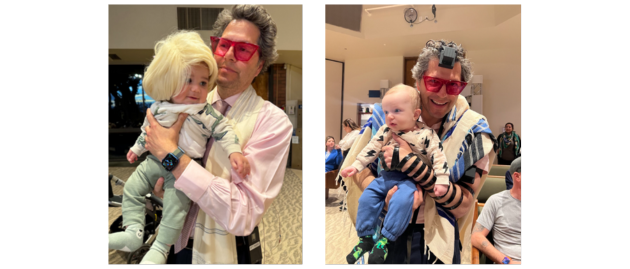My soul, my heart really needed Purim this year. Or, to be more precise, it needed the fun, silly, colorful, joyous part—the part where the kids dress up as Queen Esther or Mordechai, Spiderman or—this year in particular—Barbie. Seeing our children with smiles on their faces, pretending to be whatever they want to be, on a campus where they feel safe (and are safe thanks to our amazing community and our wonderful security team).
Last Friday we began our celebration with a beautiful Purim assembly in our school. Some of our sixth-grade students chanted verses from the megillah as the school joined together in one voice to cheer for Esther and Mordechai and drown out Haman’s name. And then at our Friday night service, we welcomed our Cantors-in-Training to our bimah to sing Purim songs and bring Purim joy.
On Shabbat morning we studied the Book of Esther and reflected on its essential messages, especially the idea of what it means to be a Jew in the diaspora where we, like Esther, have sometimes felt the desire or the need to hide our identity, to tuck our Jewish star metaphorically (or literally) inside our shirt.
And, of course, Sunday was our fantastic Purim Carnival, when our campus is filled with children and families simply having fun. With everything we’ve witnessed, with everything we’ve seen and heard, the carnival felt like a much needed release. The trauma of October 7 and its aftermath continues to assault us. As we finished reading the story of the brave Queen Esther, this week one of the women held hostage and raped by Hamas terrorists, Amit Soussana, bravely shared her story.
But the challenge of Purim is that it really doesn’t want us to experience just the silly parts, the fun parts, the raucous and joyous parts of the story. On the Shabbat preceding Purim, we always read a section from the book of Deuteronomy that teaches a broader, darker lesson about Purim, and countless other moments of Jewish trauma.
It is called Shabbat Zachor because of the first and keyword of the first verse we recite:
זָכוֹר אֵת אֲשֶׁר־עָשָׂה לְךָ עֲמָלֵק בַּדֶּרֶךְ בְּצֵאתְכֶם מִמִּצְרָיִם׃
Remember what Amalek did to you on your journey, after you left Egypt—
אֲשֶׁר קָרְךָ בַּדֶּרֶךְ וַיְזַנֵּב בְּךָ כׇּל־הַנֶּחֱשָׁלִים אַחֲרֶיךָ וְאַתָּה עָיֵף וְיָגֵעַ וְלֹא יָרֵא אֱלֹהִים׃
how, undeterred by fear of God, he surprised you on the march, when you were famished and weary, and cut down all the stragglers in your rear. (Deut. 25:17-18)
Of course, we don’t really need a commandment in the Torah to remember Amalek, do we? Because as our tradition teaches (and, tragically, our history as well), in every generation an Amalek, (including in the Purim story his direct descendent, Haman) rises up to destroy us.
Passover always comes one month after Purim and tells of another Haman—the Pharaoh who knew not Joseph—who tries to exterminate us. Once again, we are spared and every year on the 14th of Nisan we gather to tell the story, to remember our deliverance, and to celebrate our freedom. But in our remembrance, we are forced as well to recall the trauma, the pain, the near death, the deep, pervasive, persistent hatred that almost allowed an actual genocide to occur. In a few weeks, we will sit down at our seder tables and read these verses from the Haggadah:
וְהִיא שֶׁעָמְדָה לַאֲבוֹתֵינוּ וְלָנוּ. שֶׁלֹּא אֶחָד בִּלְבָד עָמַד עָלֵינוּ לְכַלּוֹתֵנוּ, אֶלָּא שֶׁבְּכָל דּוֹר וָדוֹר עוֹמְדִים עָלֵינוּ לְכַלוֹתֵנוּ, וְהַקָּדוֹשׁ בָּרוּךְ הוּא מַצִּילֵנוּ מִיָּדָם
And this is the truth for our ancestors and for us: it is not [only] one [person or nation] that has stood [against] us to destroy us, but rather in each generation, they stand [against] us to destroy us. But the Holy One of blessing rescues us from their hand.
This is the painful part, the part I thought was no longer true. Maybe it was self-delusional or maybe it was just the reality of my own experience, growing up in an America where I felt so little antisemitism. My college experience in the late 1980s and early 1990s seems like a distant fantasy when I compare it to what my daughters are witnessing today on their college campuses.
And so, maybe we do need the commandment to remember Amalek, because we are capable of forgetting, of not seeing that which is right there in front of us. I had thought—wrongly it turns out—that at least for us here in America, this tragic story, this tragic cycle had finally ended. From the right or the left, I had thought that antisemitism was increasingly on the fringes, increasingly merely a terrifying vestige of the past. But I was mistaken and this hurts my heart and keeps me up at night.
As the joyous sights and sounds of Purim recede, I find myself reflecting on what I have sadly concluded is undoubtedly true (for now at least but perhaps not for always), the truth that our Passover haggadah makes clear: there are those in each generation, including our own, who rise up to try to destroy us.
For our children and grandchildren, for the generations to come, we must do everything in our power to resist. This is one of those moments where our tradition calls us not simply to remember what Amalek did, but to raise our voices, to act, to advocate, to fight back so that we can truly become God’s partners in the blessed work of rescue and redemption.
This is our task.
May the time soon come when we will no longer have to remember Amalek, when we will no longer have to tell ourselves every Purim and every Passover that such hatred is generational, inevitable, eternal.
But that time is not now.
And so my heart still hurts.
Am Yisrael Chai,
Rabbi Yoshi

